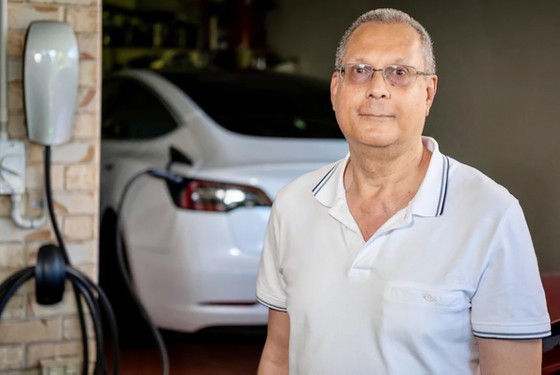SGGP
New research from the University of Queensland, Australia, suggests that charging behaviour needs to change as more electric vehicles hit the road.
 |
| Mr. Robin Claessen charges his electric car during the day. Photo: ABC |
- “When we have a lot of solar power , we need to shift electric vehicle charging to the daytime when there is a lot of power, and avoid charging at times when everyone is home, turning on all the electrical equipment, which overloads the solar grid,” said University of Queensland environmental economist Dr Andrea La Nauze.
The University of Queensland is looking at how to achieve net zero emissions with electric vehicles if they are charged with renewable energy, and early research has found a group of people switching to daytime charging. “People with rooftop solar are charging more during the day. That’s really encouraging for the future of electric vehicle charging and its ability to support the renewable grid,” Dr La Nauze said.
Robin Claessen and his wife are retirees with two electric cars and solar panels on their roof. Mr. R. Claessen plugs in the cars in the morning and leaves them charging throughout the day.
The return on investment is much greater if we use as much of our own energy as possible using additional solar, but getting people to switch to daytime charging will require more charging stations, says R. Claessen. University of Queensland researchers are also exploring the possibility of using in-car power to power homes – something the electric vehicle industry has already begun to plan for.
Mr. R.Claessen said he was excited about being able to power his home at night using electricity stored in his car.
The University of Queensland is looking at new ways to encourage people to charge their electric vehicles during the day. Dr La Nauze said the aim of the project was to determine whether electric vehicles could support the transition to a renewable grid. “We know that rooftop solar owners are already charging during the day… And the question is, can we scale that up to owners who don’t currently have rooftop solar?”
The state government has also joined in with a commitment to install more electric vehicle charging stations. Queensland Transport Minister Mark Bailey said the government was supporting the transition to electric vehicles with discounts on purchase prices, increased charging infrastructure and direct incentives for households. “As part of our $42 million commitment under the Queensland Energy and Jobs Plan, we will install more electric vehicle chargers in government buildings and convert eligible passenger vehicles by 2026,” Mr Bailey said.
The state government is also partnering with the private sector to deliver 46 new charging stations, which will sit on top of more than 50 charging sites on Queensland’s Electric Superhighway across the state. More than 2,500 applications have been approved for the zero-emission vehicle rebate program, which offers rebates of up to $6,000 for eligible new zero-emission vehicles.
The Australian Government is also engaging with industry to support the design of a home battery program that helps households harness the power of rooftop solar by installing new home batteries.
Source


























![[Photo] National Assembly Chairman Tran Thanh Man visits Vietnamese Heroic Mother Ta Thi Tran](https://vphoto.vietnam.vn/thumb/1200x675/vietnam/resource/IMAGE/2025/7/20/765c0bd057dd44ad83ab89fe0255b783)






































































Comment (0)